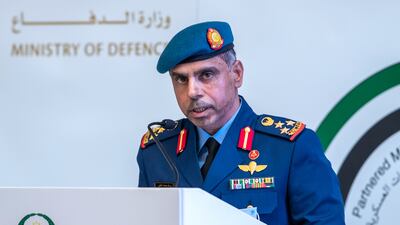The statistics speak for themselves: there are at least 40 active battlefields with 600 non-state armed groups operating around the world.
Throw into the mix 100 representatives from about 130 state militaries and you have a complex web of conflict tracked by the International Committee of the Red Cross (ICRC) over the past few years.
This is compounded by state-sponsored proxies, new technology, shifting alliances, political indecisiveness and a zero-sum game, resulting in familiar news stories about people left with nothing but the rubble of their homes.
“Across the globe there are terrible examples of where civilians are targeted, maimed and killed and livelihoods destroyed,” Clare Dalton, the ICRC head of mission to the UAE, said on Monday.
“We have to be able to look at why this is happening.”
Her comments came on the first day of a major military gathering in Abu Dhabi aimed at protecting civilians in times of war.
The UAE's Ministry of Defence and the ICRC organised the event, where more than 30 senior military officers from about 20 countries are examining how militaries can influence each other through "partnered military operations" to ensure respect for civilians and international humanitarian law.

“This event is of utmost importance,” said Brig Salem Al Kaabi, head of the Executive Department of Military Judiciary at the Ministry of Defence.
“We support everything that supports the implementation of the law. Legal advisers accompany battle commanders on the operational level but on the strategic level we have legal advisers that provide guidance on operations.”
The three-day event also aims to explore how alliances forged in the heat of battle can lessen rather than worsen human suffering.
Over the next few days, officers will discuss war scenarios, consider new tools and share feedback that it is hoped will help civilians in future conflicts.
“There will always be new ways people will find to fight war,” Ms Dalton said.
“Any situation where civilians are in some sort of danger or harm, it is a concern for us. We are trying to limit the impact it has on people’s lives and infrastructure but that’s never going to be easy.”
Conflicts in countries such as Syria and Iraq involve conventional state militaries supporting militias composed of unruly fighters whose alliances change rapidly on the battlefield.
No one person or military is in charge, exacerbating an already hostile situation for those innocent people caught in the crossfire. The task is hard.
“[Militaries] do care,” said James Seaton, global military adviser at the ICRC and a former Marine Corps commander.
“They have codes, customs and traditions. Even some of the non-state armed groups do."

“We are trying to give tools to militaries to help civilians, such as if you take down a bridge, there are electrical lines underneath. It is about understanding the second and third effects.”
The event comes three years after the ICRC and Ministry of Defence held the Senior Workshop on International Rules Governing Military Operations for the first time in the region.
Close to 150 high-ranking officers from more than 80 countries gathered in the capital at the time to discuss military rules, the rise of new technology and protecting the dignity of people whose lives have been torn apart by conflict.
It heard that the Geneva Conventions may need to be expanded to tackle the unrestricted rise of robot and cyber warfare.
The ICRC is considered the guardian of the Geneva Conventions, which set out how wars should be fought.
“If you look at conflict today there is nothing to be optimistic about,” said Ms Dalton.
She said she was hopeful things could change.
“We hear of the terrible instances where the law isn't respected but there are also examples of where militaries do their best. There are positives," she said.
"Laws need to adapt but the challenge is often agreeing on new laws."


